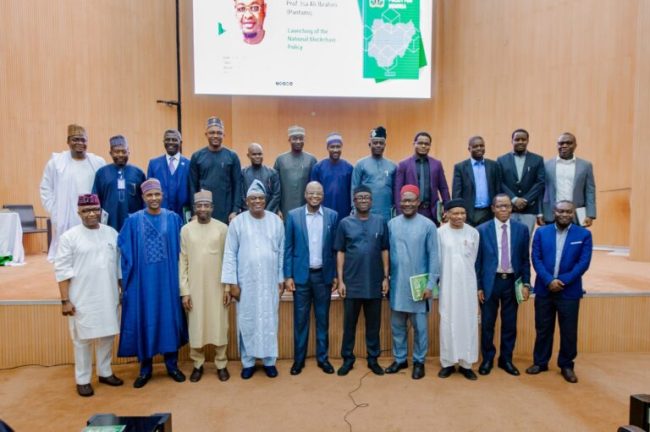A national blockchain technology implementation steering committee has been established by the Nigerian federal government.
The advisory group was introduced yesterday by the Pastor of Correspondences and Computerized Economy, Teacher Isa Ali Ibrahim Pantami at the authority send off of the Public Approach on Blockchain Innovation.

The strategy is pointed toward advancing the reception of blockchain innovation in Nigeria and to situate the country as a main player in the worldwide blockchain environment.

While sending off the Arrangement for the benefit of Central Legislature of Nigeria, Teacher Pantami reviewed that the excursion of Blockchain Innovation formally began in Nigeria on 28th November, 2019 at the Worldwide Gathering Place, Abuja where President Muhammadu Buhari uncovered and sent off the Public Computerized Economy Strategy and Methodology (NDEPS) for a Computerized Nigeria.
The Minister explained that Blockchain is still one of the Emerging Technologies and that the seventh pillar, “Digital Society & Emerging Technologies,” is now achieving the desired progress.
“We had to develop other policies, including Policy on Artificial Intelligence and Robotics, which brought about the establishment of the first ever National Centre for Artificial Intelligence and Robotics (NCAIR) in Africa, sited here in Abuja,” he stated. “In order to implement the seventh pillar, we had to develop other policies.”

Prof. Pantami mentioned, “Also, in our efforts to implement the policy, especially pillar number seven, we developed the National Blockchain Policy for Nigeria.”
Prof. Pantami emphasized the significance of the technology to the nation’s Digital Economy initiative, noting that the Fourth Industrial Revolution—which he characterized as an extension of the Third Revolution—has not marginalized the African continent. This is especially true given that African nations, particularly Nigeria, are actively participating in the revolution.
He went on to say that “Blockchain Technology,” “Artificial Intelligence (AI), Robotics,” “Cloud & Quantum Computing,” “Virtual & Augmented Reality,” “Autonomous Vehicle,” “Bio Technology,” “5G,” and “Cyber Security” are all disruptive technologies brought about by the “4th Industrial Revolution,” and that “Nigeria is one of at least three countries in Africa that are actively participating in the “4th Industrial Revolution.”
The Minister asserts that Nigeria’s position as Africa’s leading startup hub is bolstered by the success stories and displays of inventiveness by Nigerian innovators.
Prof. Pantami confirmed that the technology and all of its components and types are no longer illegal but are now legal in the Country, noting the development and subsequent approval of the National Blockchain Policy on May 3, 2023.
The head of the digital economy insisted that a total of 56 institutions and stakeholders were involved in the document’s scrutiny prior to its approval.
Prof. Pantami remarked, “This policy is to provide an enabling environment for your teaming young population, most of whom are digital natives, to participate in critical thinking, identify complex problems, and come up with solutions for the implementation of adoption in Nigeria or any other part of the world.”
Kashifu Inuwa Abdullah, CCIE, Director-General of the National Information Technology Development Agency (NITDA), who had earlier greeted guests to the opulent event, stated that the event marked a significant turning point on the road to a Digital Nigeria in which citizens have access to the most recent technology, skills, and a setting that is conducive to innovation in the field of Blockchain Technology.
Inuwa said that the policy is a big step forward and an opportunity to create a favorable environment by investing in talent, having access to technology, and domesticating.
“This will give our citizens the opportunity to create and capture value from the enormous benefits of the technology,” the Director General stated.
Inuwa who cited PWC that by 2030, the Blockchain Innovation will add $1.76Trillion to the worldwide Gross domestic product kept up with that the arrangement is to guarantee that Nigeria positions itself appropriately to benefit hence.
“Assuming the approach is carried out, Nigeria can acquire up to $4B”, Inuwa affirmed.
The National Blockchain Policy Implementation/Steering Committee was also established at the launch, and 32,022 beneficiaries who had been trained in blockchain technology graduated.
The Minister who set up the committee and gave certificates to some of the beneficiaries who had been trained in Blockchain Technology implied that the action was to build on the Federal Government’s initiative.
The council individuals numbering around 29 as introduced, contain agents from basic areas of the economy.

